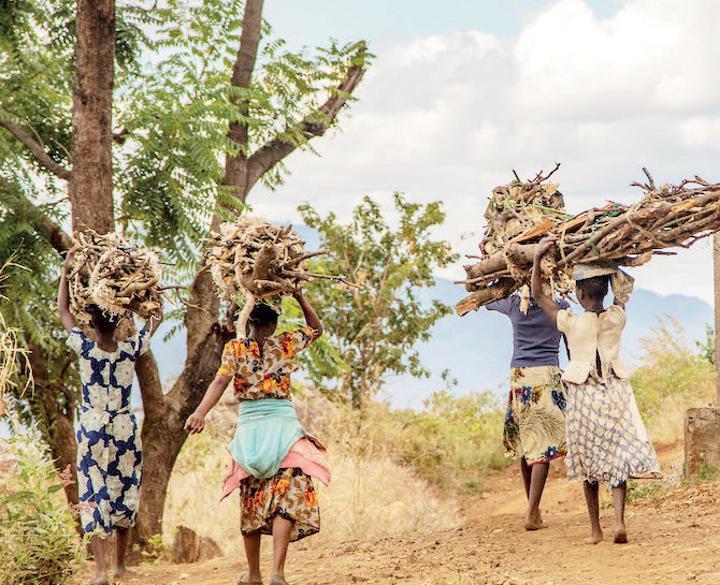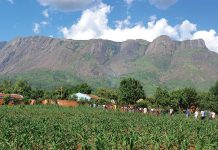Africa-Press – Malawi. Ahead of the declaration of Mulanje Mountain as World Heritage Site by Unesco on Friday, stakeholders gathered recently to express concern over the mounting destruction the mountain is sufferingBy Grecium Gama:
Once praised as Malawi’s ‘Island in the Sky,’ Mulanje Mountain now groans under the weight of destruction of her forests.
The situation has reached a crisis point.
So, recently, communities, government officials, traditional leaders and conservationists gathered in the areas of traditional authorities Njema and Sunganimzeru where the situation of deforestation is worsening for an emergency meeting.
MAGOMERO—We have been singing the same song for yearsSounding the alarm
Mulanje District Commissioner Macmillan Magomero was blunt in his remarks.
“We have been singing the same song for years. Instead of action, we have watched the mountain bleed. Mount Mulanje is not just scenery— it is our water, our bread, our climate. If we don‘t act, our children will inherit dust,” he said.
He warned that if stakeholders continue to treat deforestation as just another development issue, Malawi would soon be forced to beg for what it once owned in abundance.
Chiefs also sounded the alarm.
Senior Chief Chikumbu, Traditional Authority Sunganimzeru and Njema said they could no longer sit back and watch.
Chikumbu pledged to enforce village bylaws and ensure every household grows its own woodlot.
“We will return to the ways of our forefathers, who respected the land. The mountain is our heritage. Losing it would be like tearing a mother from her child,” she said.
Dying living
One of the most emotional voices came from Thoko Likhuluwe, a veteran tour guide from Mbewa Village under Traditional Authority Nkanda.
For years, he has earned a living guiding tourists from Likhubula to the majestic Sapitwa Peak.
“This mountain gave me life,” he said. “It built my house. It pays my children’s school fees. It fed me when I had nothing.”
He recalled better days when visitors came from Europe, America and across Africa to see the forest, drink from the streams and hike its mystical paths.
But now, he said, those days are fading.
“These days, tourists take one look at the smoke rising from the hills and cancel their trips. Some trails are impassable. The rivers are dry. The lodges are empty,” he said.
“Tourism is dying, and we are killing it with our own hands. We are like a man who eats the seed instead of planting it—what harvest will we expect tomorrow?”
Likhuluwe urged government and NGOs to save not just the trees but the future.
Destroying to survive
But some destroy it for daily survival.
James, a 31-year-old charcoal burner from the slopes of Traditional Authority Sunganimzeru, walks deep into the forest to build his kilns.
“I know it’s wrong,” he said. “But what can I do? My children need to eat. There are no jobs. I passed Form 2, but no one will hire me.”
He explained that charcoal is his only income and that most young men in his village are doing the same.
“We are not proud of this life,” he said. “But a hungry stomach does not listen to conservation laws.”
According to Clement Sellenje, Programmes Officer for the Mulanje Wildlife and Environmental Society of Malawi (WESM), the issue is not ignorance but desperation.
“People know the value of the forest. They have seen floods and droughts. But they have no choice. We have introduced alternatives like bamboo, bee-keeping, mushroom farming, and use of clean cookstoves but these need scaling up. A single tree feeds a family today, but leaves them hungry tomorrow,” he said.
Non-deterrent penalties
Newton Sodala, District Forestry Officer for Mulanje, said that enforcement is failing without support systems.
“We have chased charcoal burners, seized bags, even arrested people. But the kilns keep reappearing,” he said.
Sodala said the punishment is too lenient and called for a national review of forest laws.
“Right now, the cost of breaking the law is less than the price of a bag of charcoal. People laugh at our fines,” he said.
He also emphasized the need to strengthen community forest guards and revive local bylaws.
‘We are tipping point’
Carl Bruessow, Director of the Mulanje Mountain Conservation Trust (MMCT), said satellite imagery shows an alarming rate of forest loss, especially around water catchments.
“This is the worst destruction we have seen in years. We are losing more trees than we can replant. The mountain is at a tipping point. This is not conservation anymore—it is a rescue mission,” he said.
He called on the government to declare Mulanje a forest emergency zone and allocate immediate resources for protection and reforestation.
Chimwemwe Banda, a senior environmental policy analyst at Centre for Environmental Policy and Advocacy (Cepa), said the mountain feeds major rivers like the Ruo, Lujeri, and Thuchila.
“If this forest disappears, taps will run dry across the Southern Region. And when water goes, food goes. Health goes. Everything goes,” he said.
Minister of Natural Resources and Climate Change, Owen Chomanika, recently told Parliament that illegal deforestation is becoming a national security threat.
“We must arrest those cutting trees without licenses and provide real alternatives to energy and income,” he said.
World Heritage Site
On Friday, Unesco declared Mulanje Mountain a World Heritage Site, effectively making it a site of outstanding international importance and therefore deserves special protection.
This designation underlines the mountain‘s exceptional natural value and importance to global biodiversity.
The World Heritage listing is expected to strengthen the efforts to safeguard Mulanje Mountain‘s environment, providing a greater platform for conservation advocacy and support from the global community.
For More News And Analysis About Malawi Follow Africa-Press






